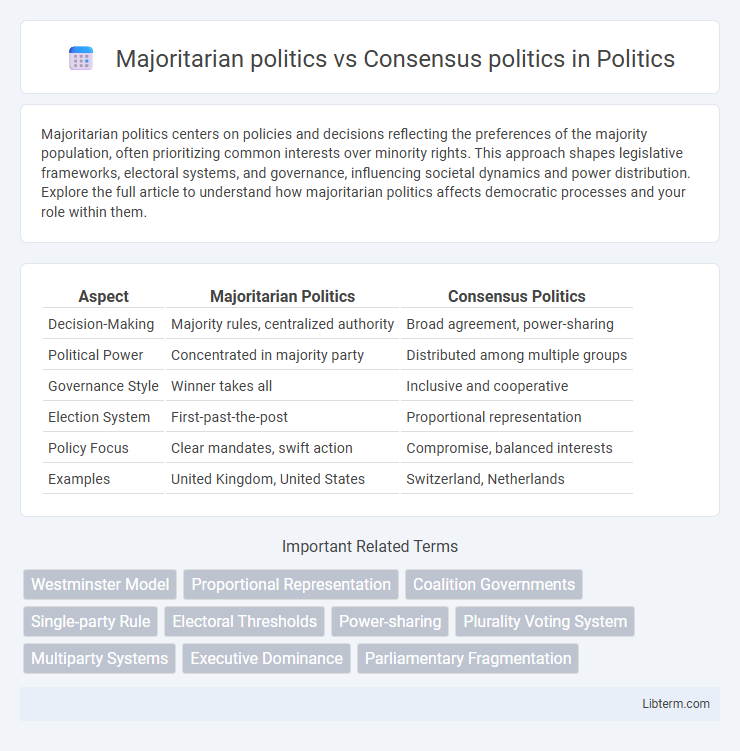Majoritarian politics centers on policies and decisions reflecting the preferences of the majority population, often prioritizing common interests over minority rights. This approach shapes legislative frameworks, electoral systems, and governance, influencing societal dynamics and power distribution. Explore the full article to understand how majoritarian politics affects democratic processes and your role within them.
Table of Comparison
| Aspect | Majoritarian Politics | Consensus Politics |
|---|---|---|
| Decision-Making | Majority rules, centralized authority | Broad agreement, power-sharing |
| Political Power | Concentrated in majority party | Distributed among multiple groups |
| Governance Style | Winner takes all | Inclusive and cooperative |
| Election System | First-past-the-post | Proportional representation |
| Policy Focus | Clear mandates, swift action | Compromise, balanced interests |
| Examples | United Kingdom, United States | Switzerland, Netherlands |
Introduction to Majoritarian and Consensus Politics
Majoritarian politics emphasizes majority rule where decisions are made by a simple majority, often leading to clear and decisive governance. Consensus politics seeks broad agreement and power sharing among diverse groups, promoting stability and inclusivity. Both models reflect different approaches to democratic decision-making and the balance of power within political systems.
Defining Majoritarian Politics
Majoritarian politics centers on the principle that the majority's will should shape governance, emphasizing winner-takes-all outcomes and centralized power structures. It often features single-party dominance and limited accommodation of minority interests, prioritizing decisive policy-making by the elected majority. This approach contrasts with consensus politics, which seeks broad agreement and power-sharing among diverse groups to ensure inclusive governance.
Understanding Consensus Politics
Consensus politics emphasizes broad agreement among diverse political groups to create inclusive and stable governance, promoting collaborative decision-making and power-sharing. It prioritizes negotiated compromise and proportional representation, often seen in multiparty systems that avoid winner-takes-all outcomes common in majoritarian politics. This approach fosters social cohesion by ensuring minority interests are respected and integrated into policy-making processes.
Key Differences Between Majoritarian and Consensus Systems
Majoritarian politics centers on single-party dominance, concentrating power to enable decisive policy implementation, whereas consensus politics promotes broad coalition-building and power-sharing among multiple parties. Majoritarian systems typically feature disproportional electoral outcomes favoring larger parties, while consensus systems strive for proportional representation to reflect diverse societal interests. The key differences lie in decision-making processes, with majoritarian systems prioritizing clear mandates and consensus systems emphasizing inclusivity and negotiation.
Advantages of Majoritarian Politics
Majoritarian politics enables decisive governance by concentrating power in the hands of the majority, which facilitates swift decision-making and policy implementation. This system often leads to clear electoral mandates, reducing political ambiguity and promoting accountability among elected officials. Additionally, majoritarian frameworks tend to simplify governance structures, minimizing the complexities of coalition negotiations and fostering greater political stability.
Benefits of Consensus Politics
Consensus politics fosters inclusive decision-making by incorporating diverse perspectives, which enhances policy stability and public trust. It reduces social polarization and conflict through collaborative negotiation, ensuring that minority voices are respected. This approach often leads to more sustainable and widely accepted policies, benefiting democratic governance and social cohesion.
Drawbacks and Criticisms of Majoritarian Approaches
Majoritarian politics often face criticism for marginalizing minority groups by concentrating power in the hands of the majority, which can lead to disproportionate policy outcomes and social exclusion. This approach risks undermining democratic pluralism and fostering political instability due to the lack of inclusive decision-making mechanisms. Critics argue that majoritarian systems can exacerbate polarization, reduce compromise, and limit the representativeness of governance compared to consensus politics.
Challenges and Limitations of Consensus Models
Consensus politics often faces challenges such as prolonged decision-making processes and difficulty achieving genuine agreement among diverse groups, which can hinder timely policy implementation. The need to accommodate multiple perspectives may result in diluted policies that lack clear direction and fail to address urgent issues effectively. Limited accountability and the potential for gridlock pose significant limitations, as political actors prioritize compromise over decisive action.
Global Examples of Majoritarian and Consensus Democracies
Majoritarian politics dominate in countries like the United Kingdom and India, where the winner-takes-all electoral systems enable a single party to hold significant power, often sidelining minority interests. Consensus politics are prevalent in nations such as Switzerland and the Netherlands, characterized by proportional representation and coalition governments that promote inclusive decision-making and power-sharing. These global examples illustrate how electoral frameworks shape governance by either concentrating authority or fostering broad consensus.
Majoritarian vs Consensus: Impact on Democratic Stability
Majoritarian politics often centralizes power within the dominant party, potentially marginalizing minority groups and increasing political polarization, which can undermine democratic stability by fostering exclusion and conflict. Consensus politics emphasizes power-sharing and broad-based cooperation among diverse political actors, promoting inclusivity and reducing the risk of majoritarian tyranny, thereby enhancing democratic resilience. Empirical studies show that consensus democracies tend to experience lower levels of political violence and higher political trust compared to majoritarian systems.
Majoritarian politics Infographic

 libterm.com
libterm.com